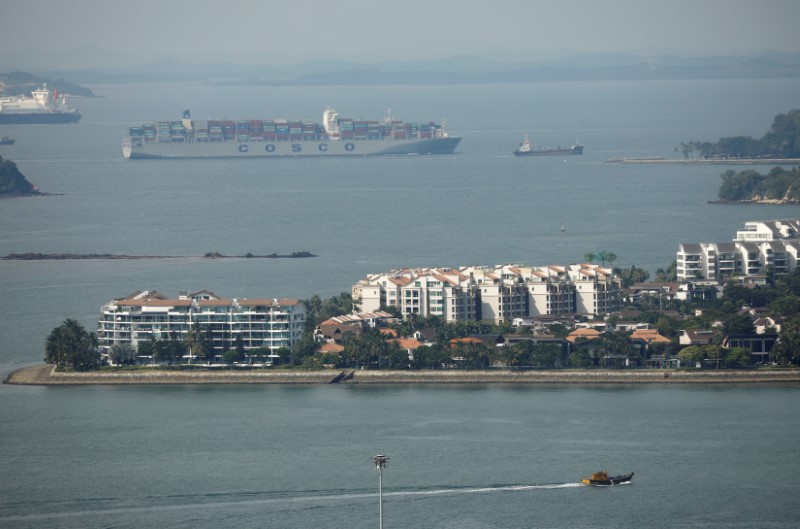By Masayuki Kitano and Aradhana Aravindan
SINGAPORE (Reuters) - Singapore's authorities are concerned the island-state's property market could be setting itself up for a fall.
A series of aggressive land deals by developers, against the backdrop of rising apartment sales and the first quarterly rise in private home prices for four years, was enough to prompt a recent warning from the nation's central bank to lenders, homebuyers and real estate firms.
There should be vigilance about risks "including the impact of rising interest rates, geopolitical developments, and excessive exuberance in the property market," Ong Chong Tee, a deputy managing director of the central bank, the Monetary Authority of Singapore (MAS), said at the end of November.
Persuading people to be more cautious could be a tough sell.
Local and foreign investors have waited years for signs that prices are bottoming out, and developers want to make sure they have a pipeline of projects in the land-starved state.
Real estate investors' animal spirits have certainly been reviving.
Singapore is looking relatively cheap compared with some other major property markets in the region – where prices have been surging almost without a pause in recent years. For example, housing prices, as of the third quarter, had risen 38 percent in Hong Kong and 54 percent in Sydney from four years earlier.
KNOCK DOWN
The property companies have been paying record sums to buy government land and existing apartment blocks, which they plan to knock down and re-build with developments that have more units.
A November report by consultancy Cushman & Wakefield estimated developers paid a 22-percent average premium for the top five residential sites in 2017 over comparable sites in the past.
Authorities say recent sales could add 20,000 new private housing units, which will more than double the number of unsold units in the pipeline within the next 1-2 years.
But developers are hungry for land because their unsold inventory is close to record lows, nearly half the level in 2013, official data shows. And any physical oversupply is still some time away as apartments take four to five years to build.
The authorities' fear is that buying fervor will run ahead of an anticipated increase in housing supply, which could create an imbalance and lead to price declines with resulting losses for those involved.
The Singapore government followed up last week by restricting the amount of land it will sell in the first half of next year to about the same level it made available in the second half of this year, versus some expectations for a hike. While this risks helping to drive land prices up further it will at least reduce the chances of overbuilding.
"The government is concerned about the manner and speed with which land prices are rising," said Desmond Sim, research head for Singapore and Southeast Asia at real estate services firm CBRE. "The government wants to keep Singapore property affordable for Singaporeans."
PUBLIC RESENTMENT
For now it is all jawboning, but analysts say the government and the central bank could intervene if the warnings go unheeded and if they see market instability.
Potential measures could include more stringent terms for buyers, curbing bank lending to developers or guidelines that may limit the units in a development.
"There have been calls for relaxation of measures, but it could be the other way around now - tightening," said Alice Tan, head of research at real estate services firm Knight Frank Singapore.
The real estate market's prospects have often been key to investor confidence in Singapore, home to some of the world's most expensive property. Singapore real estate is considered a safe haven for Asia's super-rich, who helped push private home prices up more than 60 percent from 2009 to a record high in 2013.
Public resentment over rising housing prices and immigration, which was seen contributing to a higher cost of living, were highlighted in the 2011 election, which the ruling party won with its lowest ever share of the vote.
Since then, the government slowed the growth of foreign workers and introduced more property cooling measures, such as additional stamp duties and tougher mortgage conditions.
Over 15 successive quarters, prices dropped 11.6 percent, though they did finally start rising again in the third quarter of this year, with a gain of 0.7 percent recorded.
FEAR OF MISSING OUT
The developers and home buyers are certainly optimistic.
City Developments Ltd (SI:CTDM) and Keppel Corp's (SI:KPLM) real estate unit, both of which bought sites this year, told Reuters separately that they would continue to look for potential opportunities to buy land in Singapore.
"The underlying demand from owner occupiers will still be there and this will contribute to a healthy market," City Developments' CEO-designate Sherman Kwek said.
The optimism can also be found among potential home buyers. First-time buyer Rahi Shah, 30, has waited on the sidelines since 2014 when he perceived prices were "way too high."
He bought a three-bedroom condominium in August for over S$1 million ($750,000). "I got it at the right time; prices were the lowest I had seen."
Private home transactions have risen 32 percent to 21,375 in the first 11 months of 2017 from 16,137 for all of last year, according to real estate consultancy Colliers' analysis of official data as of Nov. 28.
Others, like IT sector employee Bernard Ng, are being driven into the market because of the fear of missing out on a good deal. "If you don't buy now, it will be even more expensive next time," said Ng.

($1 = 1.3448 Singapore dollars)